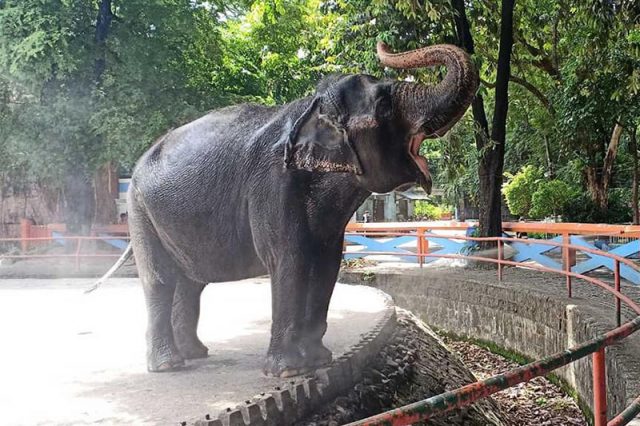
Some Filipinos opposed Manila Mayor Honey Lacuna‘s idea to possibly ask for the replacement of Mali, the Manila Zoo’s resident elephant.
This idea was floated a day after Vishwa Ma’ali, popularly known as Ma’ali or Mali, died at nearly 50 years old following decades in solitary confinement. She died on Tuesday at around 3:45 p.m.
The Manila city government said Mali died of congestive heart failure. A necropsy revealed that she also suffered from cancer and had multiple affected organs that restricted blood circulation.
Reports said her keepers noticed her irritability as early as Friday, November 24. The elephant also lost her appetite the following day.
Mali likewise had difficulty breathing before passing away.
New resident elephant
After Mali’s passing, the Manila mayor said that there are already plans to replace the late mammal who has become an icon not just in the city zoo, but in the whole country.
“‘Yung Sri Lankan government, during one of their visits here, ay nag-commit po sila na magbibigay po ulit sila. So ngayon po, i-inform natin sila at mag-co-communicate para ‘yung offer ay mag-push through,” the city chief said in a press conference.
Her comment alarmed some Filipinos who opposed the plan to bring another elephant into captivity.
“No, ‘wag na kayong kumuha ng isa pa. Tapos mag-isa na naman [siya]?” a user on the X (formerly Twitter) platform wrote.
“Please, no. Elephants don’t belong in zoos, except as a last desperate option to save their lives. Rescued elephants, as much as possible, deserve to be in sanctuaries,” law lecturer Oliver Reyes commented.
“Don’t ask for a new elephant, [my God],” another user wrote in response to Lacuna’s words.
“Unless you give another elephant the space, companion, and budget she needs to thrive, please, no,” a different Pinoy commented.
“Mali was miserable in Manila Zoo. Does the mayor even know what Mali went through?” another user wrote.
“Hala ang kapal, ‘Hello pow, patay na si Mali, penge bagong elepante na ikukulong namin ulit sa semento,'” commented a different user.
The People for the Ethical Treatment of Animals (PETA) Asia also mourned Mali’s death and called for the accountability of people “who denied her veterinary care [and] blocked her transfer to a sanctuary” before.
“We’re so sorry, Mali. You deserved better,” the organization said in a Facebook post on Wednesday, November 29.
“Thank you to everyone who rallied for her release, from Dr. Jane Goodall [and] Sir Paul McCartney to a host of Filipino stars and thousands of schoolchildren,” PETA Asia added.
Reports said Mali was an elephant sent to former first lady Imelda Marcos from Sri Lanka in 1977 as a “very precious symbol of friendship between the two countries.” The mammal at that time was a three-year-old who was found orphaned in the wild.
Her late husband, dictator Ferdinand Marcos Sr, then “entrusted” the elephant to the Manila city government, which placed it in Southeast Asia’s oldest menagerie where she became the zoo resident elephant.
Manila Public Information Office told reporters that Mali was given to the care of Manila in May 1981.
“Documents given states that she was 11 months old at that time,” Manila PIO said in a Viber message.
Mali stayed at the Manila Zoo for nearly all of her life, at some points exhibiting signs of depression and psychological stress, as well as a foot disease.
Experts said elephants are social animals, with females typically living in herds of eight or more.
Veterinarian Philip Ensley, who worked with elephants at San Diego Zoo for nearly 30 years, said that it was “inappropriate in the field of care and management of captive elephants to keep a female alone.”
Delcianna Winders, animal law program director at Vermont Law School, also said that socializing with other elephants is part of the said mammal’s nature.









